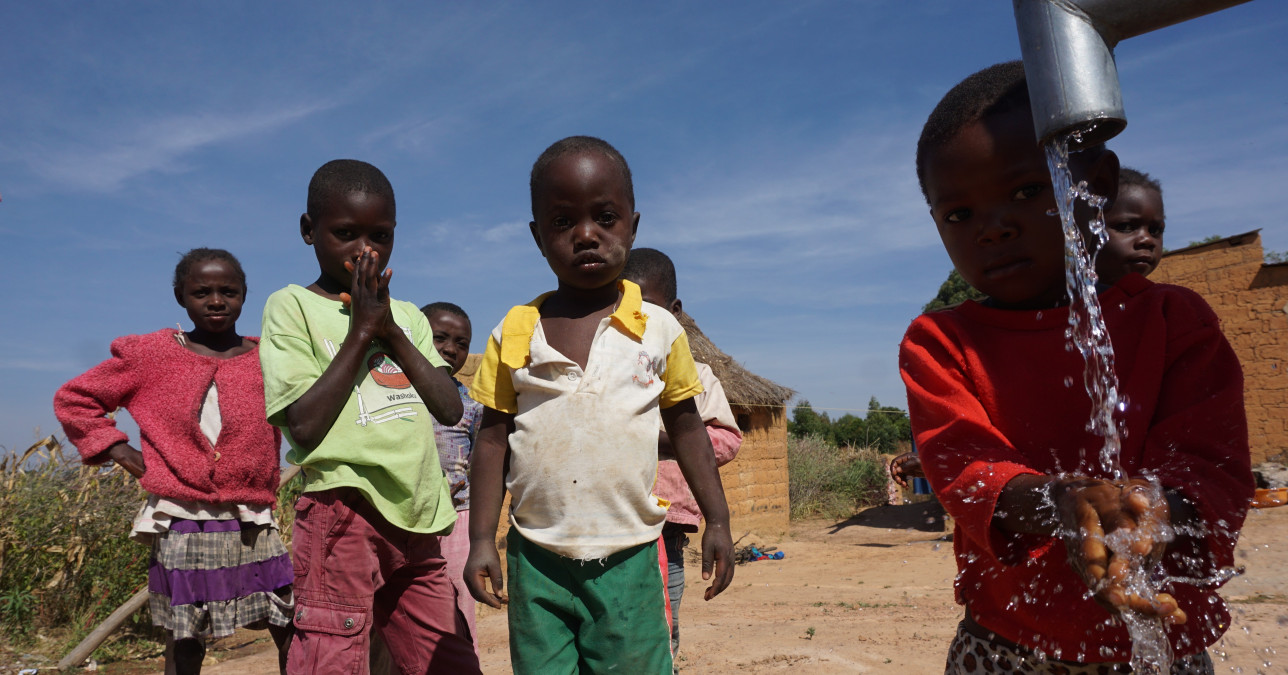Building Resilience Through Access to Water in Angola
Published: Sep 16, 2019 Reading time: 4 minutes Share: Share an articleOnly a few steps separate the new water point in the village of Samununga 2 (in the central Angola province of Bié) from the house of Luciana Kassova. “In the past, it was a pain to get water, but the water point that we have now makes things easier. It’s easier now to use the basin to bring water [into the house],” she says.

Up until last year, it was extremely difficult for members of the community to access water. Thankfully, People in Need (PIN), with the support of the Embassy of the Czech Republic in Pretoria and UNICEF, built a water pump to make water access more available for all. “They used to fetch water far from here, about two or three kilometres away in a place that has no safety or hygiene. It represented a risk to women and children, so we tried to reduce those risks by helping the community get water in a place that’s more nearby,” explains Gift Zuze, People in Need’s Project Officer for Water, Sanitation, and Hygiene (WASH). In rural Angolan communities, the women are the ones responsible for providing water for their families. The community well is especially useful because it helps reduce the burden placed on women.
Social mobilisers are trained to carry out maintenance and keep the water point functioning throughout the year. Kassova’s husband, Gabriel Lossati Luanda, is one of those mobilisers. He points out the benefits of having water near the houses. “It was a hardship when the women had to fetch water from the river. Since the water pump is here, they aren’t tired anymore, and we have water even during the dry season,” says Gabriel Lossati.
Safe water for Open Defecation Free villages
“This village was in terrible condition. People used to defecate in the open air and they were frequently ill. This is why we decided that this location should be part of the Community-Led Total Sanitation (CLTS) programme,” says Zuze, mentioning that the CLTS method uses participatory tools to get communities to reflect on their health situation, particularly on the impacts of outdoor defecation on public health and the environment.
In total, 18 villages were selected to be part of the water project, after they’ve achieved the status of Open Defecation Free, which means that their sanitation and hygiene patterns have improved. The work to end open defecation combined with the access to safe water also helps to improve health in communities. “When we didn’t have enough water, children used to always get diarrhoea, vomit a lot or have a high fever, but now these [symptoms] are diminishing,” says Lossati.
“When we began the project, we went from house to house to talk to the villagers, so that they all had a latrine. As soon as we finished this part, we started with the water points,” adds Lossati, explaining that having a safe, accessible and functional water source in the village served as an incentive for the community to achieve the Open Defecation Free status.
Community committees are managing water points
The local residents actively participate in the project. “They contributed to the building work of the water pump and are responsible for maintaining it. In each selected village, PIN supports the creation of a Water and Sanitation Committee that will be in charge of the technical and financial management of the water point,” says Zuze.
The members of those groups are trained on the Community Water Management Model, an approach adopted by the Angolan government that focus on the involvement of local groups as the cornerstone for promoting local development. The committee is elected by the community: a coordinator, responsible for presenting the needs of the community to local authorities, members in charge of the technical part – construction or repair of the water point – finance members – who plan and administer the expenses related to the water point maintenance – and mobilizers – that promote a behaviour change concerning hygiene and sanitation.
The process for nominating water committee members takes gender balance into consideration, so that women can be represented, as well.
Contributing to sustainable management of natural resources
The main objective of the project is to contribute to resilience building in the communities, and as a result, to a sustainable economic growth and sustainable management of natural resources. “In order to ensure socio-economic development and resilient populations, it is essential to establish sustainable access to clean water,” explains Zuze.
In Angola, communities most at-risk to the effects of climate change often rely on deep ground water sources to have water, even during drought season. However, these deep sources require complex water scheme technology, and external support for repair. To overcome those obstacles, we use our experience in the water and sanitation sector to produce detailed training courses and materials about manual drilling and maintenance of pumps.
Strengthening community and local government capacity and fostering their involvement in the activities helps to create a sense of ownership and ensure the sustainability of the benefits beyond the end of the project.







